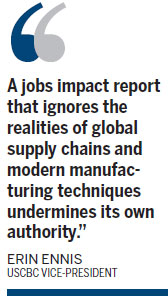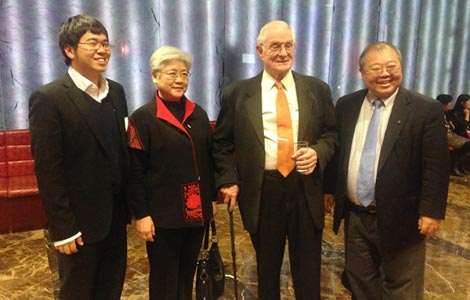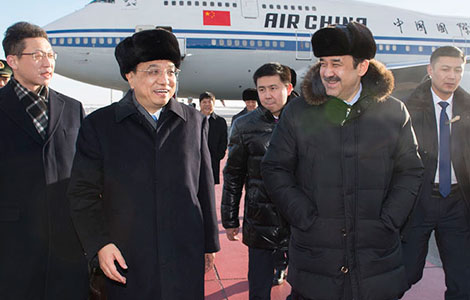China not to blame for job losses in US: Council
Updated: 2014-12-16 11:50
By Chen Weihua in Washington(China Daily USA)
|
||||||||
Like some US politicians, the Washington-based Economic Policy Institute (EPI) has for years blamed China for the loss of American jobs. When its latest such report came out on Dec 11, it drew immediate fire from the US China Business Council (USCBC).
USCBC, which represents some 220 US companies doing business in China, described EPI's report as another attempt to calculate US manufacturing job losses based on trade with China and once again uses flawed methodology that distracts from the real challenges facing the US economy and the trade relationship with China.

The EPI report, written by Robert Scott and Will Kimball, claimed that trade deficit with China cost 3.2 million US jobs between 2001 and 2013, with job losses in every state. It said that three-fourths, or about 2.4 million jobs, were lost in manufacturing.
USCBC said the EPI's report -- China Trade, Outsourcing and Jobs - is "the same kooky math, different year."
"EPI is still basing its calculations on the scenario of 'what if every product we import from China was instead made in the United States?' As USCBC has said repeatedly to previous versions of this EPI report, this assumption is faulty and is decades wrong," USCBC Vice-President Erin Ennis said in the statement.
On Dec 12, US Trade Representative Michael Froman touted the benefits of US trade with China.
US exports to China have grown by more than 50 times since 1983 and bilateral investment has also skyrocketed. China is now the US' second largest trading partner, according to Froman. Canada is No 1.
"And for the US, that has meant our exports to China have increased, and that has meant more good-paying jobs supported by trade, it's meant more competitive businesses, it's meant more consumer choice, as well," Froman told a briefing about the 25th session of the China-US Joint Commission on Commerce and Trade to be held in Chicago this week.
US politicians, such as former Massachusetts Governor Mitt Romney in his presidential campaign two years ago, have also blamed China for the loss of American jobs to woo working class votes.
"Much of what we import from China today simply replaces imports from other countries like Japan, Singapore and South Korea, not products we make in the US today," said Ennis, who has been on the job since 2005.
"A jobs impact report that ignores the realities of global supply chains and modern manufacturing techniques undermines its own authority," she said.
Ennis expressed her disappointment at the EPI report that continues to make the link between the appreciation of the Chinese currency yuan, the US trade deficit and loss of US jobs.
"China's currency has appreciated over 30 percent against the dollar since 2005, but there has been no significant corresponding decrease in the trade deficit, showing there is a limited link between the two," Ennis said.
In October, the US Treasury Department said China does not manipulate its currency.
US Undersecretary of Treasury Nathan Sheets said in a talk in Washington 10 days ago that China has made real progress in moving toward a market determined exchange rate, he hoped that China would keep that momentum and hinted more work remains to be done.
A 2011 St Louis Federal Reserve Bank report debunked the idea that appreciation of China's currency would create significant jobs in the US. "As they rightly noted, RMB appreciation would increase import prices without bringing many job opportunities back to the United States," Ennis said.
According to an earlier article by Daniel Ikenson of Cato Institute, in the quarter century between 1983 and 2007, as real GDP more than doubled and the real value of US trade increased five-fold, the US economy created 46 million net new jobs, or 1.84 million net new jobs per year.
The USCBC report said the EPI report continues to attribute job losses solely to the goods trade deficit and fails to take into account the significant productivity increases that have been achieved by today's modern US manufacturers that require fewer people to produce more goods.
"America makes more things with fewer jobs as productivity has risen over the past 40 years," Ennis said. "The decline of manufacturing employment in the United States is a long-term trend that has been going on for decades, well before China was a major trade partner."
The USCBC report admitted that some American workers do lose their jobs to lower-cost imports. It said that US policymakers need to ensure these workers have the opportunity to transition to new work in growth sectors of the economy.
"The overall US economy has benefited significantly from trade in general and trade in China in particular," Ennis said.
"The key is not to build walls around the United States or pursue the failed isolationist policies of the past. We must make sure our companies and workers stay competitive and remain the global leaders in manufacturing."
chenweihua@chinadailyusa.com

 Ground broken in NYC
Ground broken in NYC
 University students awarded C-100 scholarships
University students awarded C-100 scholarships
 'Early Mona Lisa' traced to English country home
'Early Mona Lisa' traced to English country home
 China deepens Americas ties signing pacts
China deepens Americas ties signing pacts
 Chinese premier arrives in Kazakhstan for visit, SCO meeting
Chinese premier arrives in Kazakhstan for visit, SCO meeting
 People hold candles to mourn victims of Nanjing Massacre
People hold candles to mourn victims of Nanjing Massacre
 2014 Toronto Santa Speedo Run held in Canada
2014 Toronto Santa Speedo Run held in Canada
 Life on his father's back
Life on his father's back
Most Viewed
Editor's Picks

|

|

|

|

|

|
Today's Top News
Greenland Group starts NY housing project
Graft watchdog steps up SOE investigations
China's ex-PM donates $6m to foundation
HK losing its appeal as an IPO market
China-US trade talks get started in Chicago
Chinese liquor in deal with US firm
Chinese chess captivates fans
HK chief calls for respect of law as protests end
US Weekly

|

|







